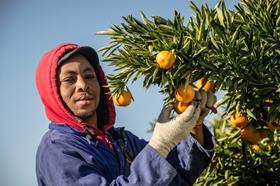
The South African Citrus Growers Association (CGA) has called for applications to a R307m Economic Transformation Programme for black citrus growers, which is expected to create an additional 1,726 permanent and seasonal jobs in the citrus industry.
The CGA’s Justin Chadwick said the announcement of the fund was welcome news as South Africa begins the difficult task of rebuilding its economy amidst the Covid-19 outbreak.
He said the creation of employment opportunities, especially in rural areas, were an essential step on the road to economic recovery.
The CGA last year submitted an application to the Jobs Fund, supporting work creation in South Africa, for a project that would make funding and technical support available to black citrus growers.
Chadwick explained that the funds are intended for orchard establishment, expansion and rehabilitation, as well as the on-farm development of infrastructure, including packhouses, bulk-water supply and irrigation systems.
The Jobs Fund has committed R118m to the project and the Land Bank, a government supported bank supporting agricultural development, agreed to contribute an additional R116m in loan funding.
“The CGA has contributed R24m, while the Department of Agriculture Forestry and Fisheries and AGRISETA have pledged R34m and R12m respectively,” he said.
An agency, Lima Rural Development, has been appointed as the programme manager, with the CGA’s Citrus Academy providing skills development support (which is compulsory for all programme beneficiaries), while the CGA Grower Development Company (CGA-GDC) will be the implementation agent for the programme.
Chadwick outlined that the programme would be implemented over three years across South Africa, with a specific focus on the Limpopo Province, Mpumalanga, Eastern Cape, North West and KwaZulu-Natal.
“To qualify for funding growers have to have a minimum of 60 per cent black ownership (of both assets and operations) as defined by the South African B-BBEE Act of 2013, while priority will be given to enterprises with 100 per cent black ownership.”
Other criteria that need to be met include the production or packing of citrus fruit that is exported, having appropriate management structures, as well as relationships with external service providers, such as financial auditors, legal services, logistics and fruit exporters.
Human resource development plans, security of land tenure and sufficient water supply will also be taken into account. “Most importantly, applicants must also demonstrate that they will create permanent and seasonal job opportunities with the development funding,' Chadwick continued.
Lockdown
The citrus industry has focused on ensuring consumers have access to fresh citrus while safeguarding the health of its workers during the national lockdown.
“However, we know Covid-19 poses many risks to the agriculture sector, in particular, smaller-scale and developing farmers who already face financial challenges,' he noted. 'We believe the Economic Transformation of Black Citrus Growers Programme will help mitigate the impact of the pandemic.
'We also hope to make a major contribution to one of the CGA’s and government’s main objectives, which is to grow the volume, value and level of participation of black citrus growers in the industry.”
Najwah Allie-Edries, head of the Jobs Fund, said that despite work done over the past few years, transformation in the industry remained constrained, with the usual barriers persisting.
“The Jobs Fund’s participation will enable the CGA to increase the pool of black citrus growers who will be given the necessary resources to ensure that they expand their operations and become sustainable,' Allie-Edries added. 'The revolving loan component will ensure the programme’s continued ability to reach more growers post the Jobs Fund’s involvement.'



